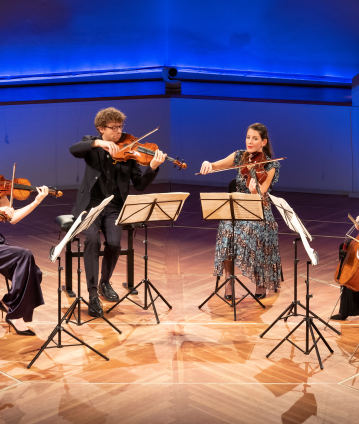Philharmonic chamber music: Of pilgrims, lovers and child prodigies

A man, a woman and a love that breaks conventions: Richard Dehmel’s poem Verklärte Nacht inspired Arnold Schoenberg to write his string sextet of the same name. That work in turn inspired the 17-year-old Erich Korngold to write his expressive string sextet. In an arrangement for string quartet, Franz Liszt’s Angelus! Prière aux anges gardiens from his piano cycle Années de pèlerinage testifies to his maturity.
Johannes Brahms may not have invented the genre of the string sextet, but he set standards with his two works for two violins, violas and cellos: both Arnold Schoenberg and Erich Wolfgang Korngold, whose string sextets are performed here by members of the Berliner Philharmoniker, are unmistakably linked to the late Romantic composer.
Schoenberg’s Verklärte Nacht – the first instrumental work by the 25-year-old composer to be given an opus number – is based on the poem of the same name by Richard Dehmel. It tells of a nocturnal walk by two lovers. The woman confesses to the man that she is pregnant by another man. The conflict that arises from this announcement is clearly audible in the thematically dense music – as is its resolution: at the end, the man promises to raise the child as his own.
Hailed as one of the greatest prodigies in music history, Korngold also showed himself to be an accomplished master in chamber music at an early age. The sextet, which the composer completed while still in his teens, is characterised by a confident treatment of themes, daring harmonies and an unmistakable melodiousness with a Viennese touch.
The chamber music ensemble juxtaposes the two youthful works with a work by the mature Franz Liszt. The Angelus! prayer – here in an arrangement for string quartet – comes from the piano cycle Années de pèlerinage. In the austere, mysterious writing of his late style, Liszt combines a bell motif oscillating between two notes with a chorale theme that seems almost fragmentary.
© 2023 Berlin Phil Media GmbH